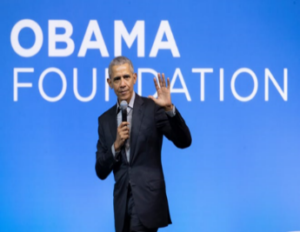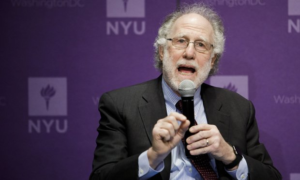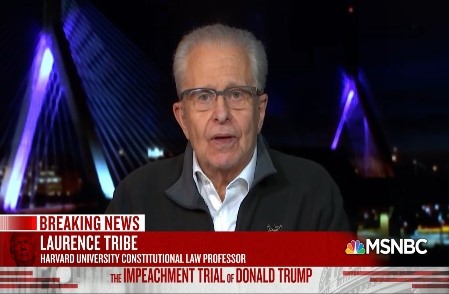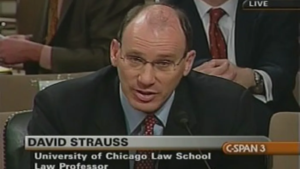In order to mandate progress in the name of law, especially in the name of constitutional law, it is necessary to deceive. Where the law is backward, it must be made to seem progressive. Where the law is uncertain or permissive, it must be made to seem definite and mandatory. Where arguments are limited and honestly debatable, they must be made to seem comprehensive and inescapable. Where opponents refuse to yield, their positions must be distorted or they themselves must be belittled and insulted. Prudence is the opposite of ideological moralism. It is what the decay inherent in liberal idealism consumes. Robert F. Nagel, The Implosion of American Federalism, and Unrestrained: Judicial Excess and the Mind of the American Lawyer
A culture that is at once moralistic, self-righteous, alienated and in a minority will constantly be tempted to break the rules of political discourse—indeed to conduct its struggles in ways that preclude the use of the word “discourse” —and to gain its ends by deception or outright falsehood. Robert Bork, The Tempting of America: The Political Seduction of the Law
In the early 1990’s when I worked in the Former Soviet Union for a large multi-national corporation looking at doing “deals” in the suddenly open communist country—a massive advanced industrial empire that was quickly destabilized by the economic theory of “shock therapy” which was advanced by Columbia University advisor Jeffrey Sachs and University of Chicago Nobel economist Milton Friedman—we were often told by native Russians to “watch out for the shakher-makhers.” This old slang, heard in Russian, German, and often in Yiddish on the streets of New York, means “wheeler-dealer.” It implies an underhanded street hustler; a “conman” and in early twentieth-century America, implied gangster affiliation—especially the country’s largest criminal enterprises composed of Jewish immigrants or second generation inductees into organized crime.
As the disastrous Russian privatization program—notionally advertised as a means of distributing shares in state-owned enterprises to the larger public—spun rapidly out of control, it became clear who was actually getting all the stock and control of the old Soviet industrial corporations: a small, tightly knit group of “shakher-makhers,” almost all Jewish. In the end some went to prison, or fled, after the incompetent Boris Yeltsin was replaced by the cool hand of Vladimir Putin; others made off to Switzerland, and a few more ingratiated themselves with the new leader (and still do).
Fast forward to 2021 and it is not hard to discern a consistency in this general observation made over many decades, if not centuries, by the competing gangs, law enforcement, or the victims of their criminal operations. As I discussed in the Summer 2020 issue of The Occidental Quarterly, this current cultural phenomenon, a “Neo-Bolshevism,” finds a consistent traction in our nation’s law schools. In that article, titled, “The New Bolshevism in the Legal Profession: The Effect of Activist Law Faculty on Standards of Jurisprudence, Professional Conduct, and University Pedagogy,” I noted:
There is an especially visible commonality in the current U.S. political economy that is defined by an ethno-religious and state special interest that is advanced largely through the re-casting and re-purposing of law. The modern university law school sits in its organizational center, acting as an asserted professional authority on legal interpretation; as an activism network node; and as an ideological pedagogic institution among students in captive degree programs.
The recently announced White House “Presidential Commission on the Supreme Court of the United States,” exhibits many of these features, and in a very visible manner. While the Commission is a putative presidential authority, it should be clear that the current U.S. president is merely a proxy for the agenda of a special interest syndication, led in several important ways by the former president, Barack Obama, and the members of his Foundation.

The Obama Foundation: “The seemingly independent factions are in actuality part of a larger ‘family’ or ‘gang’ of wealthy and radical individuals and organizations. With former President Barack H. Obama’s Foundation at the top, they operate similar to an organized crime family—on the periphery of civil society.”
As a graduate of Harvard Law School and in the capacity of a “professor” at the University of Chicago Law School where he taught a course on “race and law,” Obama turned to his old colleagues—including some of his former White House advisors—to head up the Commission, whose ostensible purpose is to provide “window dressing” and a gloss of objective analysis before a final push is made to add at least four new liberal justices to the SCOTUS bench, and establish an effective permanent Left majority on a court effectively converted into a legislative body. From TOQ:
I refer to a dominant, highly organized, efficient and resource-rich political party coalesced around Israeli interests. Those interests include strictly economic ones (including organized crime); religious and ethnic enthusiasms, and geopolitical ambitions (the pan-Israel construct). Although criticism of Israel—such as John Mearsheimer and Stephen Walt discuss in The Israel Lobby and U.S. Foreign Policy—can be seen in a simple mono-directional manner (i.e., aid and finance flowing from the U.S. to Israel), Israel also serves as an “incubator” for U.S. domestic security policy, law enforcement, and related State projects. Israel is effectively America’s “third political party.”
Indeed, as Israeli activist Ilana Daniel states:
“We are being used as a model for the rest of the world. Many of us are calling this a new holocaust in our own country. You could not have created a bigger betrayal. This has nothing to do with a virus. It leaves behind the arguments of right and left, pro and anti, even religious designations, and asks of us: what are the most basic common denominators we share?” (Ilana Rachel Daniel, Israeli political activist on Israel’s current state authoritarian Covid policy and the “purity test”).
The especially poignant irony in her case is that Israel is held out as the only “democracy” in the Middle East—generally politically progressive, socially tolerant, governed by parliamentary system, and with a modern free press and purported strong ties to the US, UK, Germany and France. Yet its extremism in biosecurity is highly authoritarian and has survived a broad legal challenge brought by protestors in Israel’s Knesset and courts and by a determined radical legal activist syndicate of legal and other professionals. Its higher education system, coupled—like the US—to industrial and defense interests, is highly active in bio-security research, legal policy, and molecular engineering, while its notorious Mossad intelligence agency is, like the US DHS complex, turned inward on its own citizens. It is indeed a “model” for US special interests that make up its “intelligentsia.”

Who needs the Constitution? How to bypass voters and get the entire Covid policy panoply pushed into non-objective law without public deliberation, or the hard work of constitutional amendment: Hire the шахер-махер: the Obama SCOTUS Court Packing “Commission,” led by NYU Law’s Bob Bauer, above. Who is packing whom?
The lead member of the Commission is former Obama White House advisor and radical NYU Law professor Bob Bauer, accompanied by his former professor, Harvard’s notorious Laurence Tribe who believes there is an “invisible constitution” that means whatever you want it to, followed by Chicago Law’s David Strauss, an old colleague of Obama and a loyalist who wrote “The Living Constitution,” which is among a set of academic works arguing for a coercive moral activism from the courts. All three are close personal friends and loyal, ideological allies of the former president and his current political operations.

Laurence Tribe
A Balanced Commission?
There are some on the left who assert that, because the Commission includes some law professors who are considered moderate or generally conservative, such as UChicago Law’s well-regarded and youthful constitutional scholar William Baude, that it will either result in an effective “hung jury” concerning what explicit or implied recommendations it may or may not make, or that it will not be forceful enough to convincingly ratify the Administration’s (and the Obama Foundation’s) court-packing agenda that Progressives are seeking (as one writer notes, “Congressional advocates of court-packing are moving ahead as though the Commission doesn’t exist. They have introduced legislation to add four justices, just enough to give the court a majority of Democratic appointees instead of Republican ones”). For others, a few moderate commission members make it seem fair and balanced, so that no particular faction could dominate it. But this rests on a more fundamental flawed assumption: that there is a public mandate for such a “commission” in the first place. In fact, it is an invention of the Left, and merely another political tool that seeks to make—like prior unconstitutional state voting law changes that had such dramatic effects on the 2020 election—the extra-legal appear as if it were perfectly legal, normal and even welcome. In this case, it is accomplished by using traditional institutional processes and forms (like commissions, committees and other symbolism) to mask what is in reality a very different, radical, and even legally violative content.

David Strauss
It is important to appreciate that such commissions are highly susceptible to manipulation by their external sponsors (the Clinton and Obama Foundations), and especially, that once formed, the commission leader (in this case former Obama appointee and radical NYU Law professor Robert Bauer), along with his senior and ideologically aligned colleagues, have significant powers as far as what the final report will include, what is omitted, and how the narrative is presented and “spun” (the 911 and Warren Commissions are examples). The fully left-progressive Yale Law has more commission members than any other single law school, followed by predominantly left-progressive Harvard and Chicago, and the commission includes former Clinton speech writer and head of the far-left NYU Brennan Center, Michael Waldman).
“Never Trump” commission member, Harvard Law’s Laurence H. Tribe is an especially revered icon among the Left (he even sued President Trump) and is worshiped by all his many former students working as law professors. Indeed, as former Dean of Stanford Law, Kathleen Sullivan gushes in her fawning law review article on Tribe: “[He] is the greatest living intradisciplinary scholar of constitutional law—and perhaps simply the greatest such scholar ever.” Tribe carries enormous weight in the Commission hierarchy (not unlike the sociology of a primate group). He was also a mentor to Barack Obama at Harvard Law, and, during Obama’s tenure as editor-in-chief of the Harvard Law Review, he published a paper that argues how relativity theory in physics can be used to explain a “relativity” in law, meaning law is fungible, elastic, a morally relative topology, and ultimately unsettled (which some critics in academia have called a “crackpot theory”).
Moreover, the three senior members of the Commission who are especially close to Obama, also have significant “academy” power over the younger members such as Baude and legal historian Alison LaCroix, who are also still managing their careers and are dependent on continued favor and acceptance from their law school colleagues (almost all far Left or progressive) and in reality have limited independence. Their “home” law schools are also institutionally influential, and in Chicago, Harvard and NYU’s case, all are aligned politically with the current left-progressive agenda of the Democratic Party. They may “protest” but it will be done politely, theoretically, academically, and be at best merely a mild “dissenting” view that is used to sell a fair and balanced political act, as the underlying court packing plan is politically contentious.
The Commission also includes David F. Levi, whose father, Edward Levi, was the former Dean of UChicago Law, and past president of the University of Chicago (and namesake of the main administrative building “Levi Hall”). David’s brother, John Levi, is credited with hiring Barack Obama for his law internship in Chicago, and for also hiring Michelle Obama, providing the opportunity for them to meet, and eventually marry. One big happy family (and the Levis, all from a family of rabbis).
The Commission is in fact, a very tightly affiliated, private team, led by senior members from the law schools of Harvard, Yale and Chicago, with a traditional hierarchy of “lieutenants” just below them—and importantly, from the same university institutions, which reinforces consensus or obedience. All of these senior members are ideologically aligned and active in political commentary and public relations, including the Dean of Yale Law, Heather Gerkins, liberal Dean of NYU Law Trevor Morrison, and NYU Law’s Rick Pildes who specializes in election law, the eradication of the electoral college, the modification of state voting rules, and is a source of regular left-progressive opinion including as a regular commentator on CNN and an op-ed writer for the New York Times. Pildes is a political authoritarian and a clever arguer. In his most recent New York Times article, titled “How to Keep Extremists Out of Power,” he argues that voting laws should be modified so that political moderates—he considers Trump supporters to be extreme—would be favored. Yale Law Dean Gerkins is just as radical. She promotes a government construct she calls “nationalist federalism” that is a coy way of acknowledging state and local government, but increasing the consolidation of power in Congress, with effective hegemony over state government (which is what H.R.1—the “For the People Act,” proposes; it’s no surprise that Michael Waldman’s Brennan Center is all for it). Gerkins’ Yale Law colleague, Jack Balkin, previously on the faculty of law at Tel Aviv University, and a well-known Marxist constitutional “deconstruction” activist is also on the Commission. Belkin advances what he refers to as a “memetic, ideology and transcendence” construct of jurisprudence, and he is known for his concepts of “ideological drift,” “nested oppositions,” and legal semiotics.
In all these cases, their radicalized “neo-Bolshevist” and critical legal studies or “CLS” views, are precisely those that would be pursued in a new “packed” Supreme Court. This is why they are on the Commission: it is ideologically unified and institutionally concentrated in the so-called legal reconstruction advocated by Yale’s notorious Bruce Ackerman, and professionally incestuous in numerous shared relationships in employment, politics and government assignments, including in judicial clerkships.
The commission does have some limited constitutional diversity, but they are institutionally isolated, far less in favor, or even recognition, by the Commission sponsors, and are the proverbial “potted plant” as far as actual group power and influence. Moreover, this is a very traditional East-Coast “elite” law school project of establishment liberals: there are no commission members from the Universities of Wyoming, South Dakota, Texas, Florida, Montana, Iowa, or any solid “red” states. It is far from even symbolically representative of America: This is effectively a private law trust acting as a private commission carrying out a private agenda for private interests.
But even if the Commission were to produce a “balanced” report, or create the impression of bi-partisan judgment, it is, like all such commissions, merely “window dressing” and a public relations gesture of impression management. All warfare (or lawfare) involves deception, and in the case of Washington, D.C. culture, a document that provides deniability, or points to consideration and a symbol of participative democracy. The actual make-up of the Commission, however, and its clear mandate from its sponsors (not the public) tells the purpose, motivations, and larger political intent of the group to which it belongs. If, as some on the Left have criticized, the Commission “will go nowhere,” that is largely what it is supposed to do: it is merely political “chum” or bait to consolidate critics and advocates alike. What matters in the end is what Congress, the White House and the Roberts Court itself does (and what American citizen critics do). As NYU political science professor Ana Harvey smartly researched with convincing statistical analysis, “The U.S. Supreme Court does not appear to decide constitutional cases independently of elected branch preferences. They are extraordinarily deferential to those preferences, in particular the preferences of majorities of the House of Representatives. It is even more evident when we control for selection bias in the Court’s docket.” That dynamic, combined with removal of the Senate filibuster, and overwhelming external financial and other pressure, is what the actual court packing political weaponry consists of.
As I wrote in TOQ:
[This is part] of a complex political network that is intellectually centered in elite law schools that codifies activism and provides a pipeline of ideologues into the government apparatus. It is almost entirely made up of pro-Israel radicals (Henry Kissinger, Laurence Tribe, Louis Kaplow, Cass Sunstein, Bruce Ackerman, Alan Dershowitz, Eric Posner, and others) who provide a “senior authority” symbolism that is reinforced with dozens of second- and third-tier ideological colleagues, including those in foreign and military policy, and financial institutional and media influence roles. Such ideology is channeled into policy that is then “sold” through the Congressional apparatus and with careful appointee maneuvering in senior advisor and administrative roles in State, the White House, the Pentagon and the intelligence, security and law enforcement agencies. The model rests largely on an elitist intellectual identity which is necessary in order to anchor relatively complex conceptual and linguistic framing that can then flow through an elitist social network. While this picture has been described before, it rarely puts its finger on the more sensitive, if difficult ethno-religious and cultural content that is the inherent basis of the instincts, motivations, interests and ideology that initiate, manage and distribute the necessary intellectual content through the institutional architecture that converts it operationally. The central operational coding consists of a “Neo-Bolshevism” that projects a social justice philosophy, but is at its core a fascistic, authoritarian ethno-religious [obsession] that manifests in systematic institutional social predation, including most recently, the roll-out of long-incubated plans that seek to dismantle several traditional Western cultural traditions and replace them with a de facto theocracy centered in…key social controls that isolate and de-socialize public interaction while increasing public economic dependence and cognitive infantilism.
The new Presidential Commission is precisely of this character. It is a clear expression of organized ideology that resides consistently throughout America’s university law schools that are functioning, in this case, as unconstitutional, extra-legal political operating arms of special interests. The individuals with the most power have a history of acting as “hired guns” of the DNC party agenda, with consistently little if any regard for the rule of law, the U.S. Constitution, and especially, the hard work of bi-partisan compromise and separated governance that upholds the founding political philosophy of the United States, a philosophy perhaps most centrally in John Locke’s “Two Treatises of Government.”
V.S. Solovyev is a graduate of the University of Chicago.